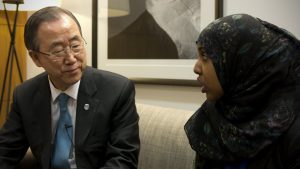BRISTOL – Setting a record of brilliance, a Muslim teenager has become one of the youngest people in the UK to receive a doctorate degree, bagging this honor in recognition of her efforts for campaigning for an end to female genital mutilation (FGM).
“I couldn’t believe it when the university told me,” 19 year-old Fahma Mohamed told Bristol Post.
“I had just started school at City Academy where Lisa Zimmerman (from Integrate Bristol) was my English teacher at that time.”
The former City Academy pupil will be starting university at Kings College London this September, taking on an undergraduate degree in Biomedical Science.
The young Muslim lady rose to fame after she led a campaign to end FGM with charity Integrate Bristol nearly five years ago.
Only 14 at that time, Fahma bravely spoke out about FGM in Britain and how she perceived this as a form of violence against girls.
Two years later, she led a national campaign to put an end to torture and abuse experienced by girls through FGM, , and in the course of this, she met with United Nations’ secretary general Ban Ki-Moon.
She also launched a petition and wrote a letter to then Education Secretary Michael Gove, asking him to protect every girl from FGM.
FGM includes procedures that intentionally alter female genital organs for traditional socio-religious and other non-medical reasons.
The practice is mostly carried out by traditional circumcisers, who often play other central roles in communities, such as attending child births.
FGM is internationally recognized as a violation of the basic human rights of girls and women and is mainly carried out on young girls sometime between infancy and the age of 15.
Many countries have put in place policies and legislations to ban the practice.

Fahma speaking with United Nations’ secretary general Ban Ki-Moon
Success
The campaign culminated in compulsory training for public sector workers to help teachers, doctors and social workers identify and assist girls at risk.
“We kept hearing about the charity and the work that was done there, but I had no idea what FGM was. I was even more shocked it was practiced in Bristol – in Britain,” Fahma said.
“It was such a taboo subject that no one talked about it.
“I knew then I wanted to get involved with the charity. I was quite shy and reserved at first, but they helped me grow into it.
“I kept thinking about how helpless the girls [victims] were feeling and that was what motivated me to keep going.”
Fahma awaits the special ceremony this Friday when she will be officially given the doctorate at Bristol University’s graduation ceremony.
“I’m quite nervous, but it’ll be nice to have my family there with my friends,” Fahma said.
“It can be quite overwhelming, but I’m really looking forward to it.”